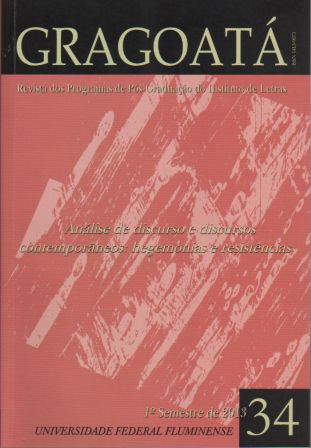Análise discursiva do Plano de Desenvolvimento Institucional do CEFET/RJ: uma proposta de resistência a um discurso institucional hegemônico
DOI :
https://doi.org/10.22409/gragoata.v18i34.32972Mots-clés :
discurso institucional, ensino profissional e tecnológico, produção de subjetividade, relações poder/ saberRésumé
Considerando as mudanças em curso na organização da rede federal de educação profissional e tecnológica, buscamos problematizar o papel do discurso como mecanismo de produção e manutenção de relações de saber e poder hegemônicas que engendram subjetividades de uma comunidade heterogênea como um projeto hegemônico em um documento oficial do CEFET/RJ. Nosso objetivo é identificar a construção discursiva da noção de comunidade como grupo que sustenta o discurso institucional de apoio ao projeto de transformação em Universidade Tecnológica, considerando de que modo o referido documento pode dar visibilidade à heterogeneidade que constitui uma instituição na qual coexistem os níveis médio, técnico e superior. Para tal, apresentamos uma análise discursiva do Plano de Desenvolvimento Institucional do CEFET/RJ e, como referencial teórico, seguimos as propostas de uma análise do discurso enunciativa, que se orienta pelas noções de interdiscurso (MAINGUENEAU, 2005) e de dialogismo (BAKHTIN, 2000; 2004) e pelas relações entre poder, saber e subjetividade (FOUCAULT, 1987, 1996; 2004). Entendemos que nossas análises linguísticas remetem, no documento analisado, a duas reflexões relevantes. A primeira é uma valorização de saberes que relacionam a instituição a um ensino pautado na eficiência, produtividade, organização e desenvolvimento, semelhante a qualquer empresa comercial ou industrial, que prioriza principalmente atitudes necessárias no mercado de trabalho capitalista, e em lugar de formação de um trabalhador, o adestramento, a docilização de corpos que possam ser úteis ao mercado de trabalho. A segunda seria a homogeneização da comunidade como grupo que, mais do que sustentar PDI, respalda discursivamente o projeto de Universidade Tecnológica.
Téléchargements
Téléchargements
Publiée
Numéro
Rubrique
Licence
AUTORIZAÇÃO
Autores que publicam em Gragoatá concordam com os seguintes termos:
Os autores mantêm os direitos e cedem à revista o direito à primeira publicação, simultaneamente submetido a uma licença Creative Commons Atribuição 4.0 Internacional (CC BY 4.0), que permite o compartilhamento por terceiros com a devida menção ao autor e à primeira publicação pela Gragoatá.
Os autores podem entrar em acordos contratuais adicionais e separados para a distribuição não exclusiva da versão publicada da obra (por exemplo, postá-la em um repositório institucional ou publicá-la em um livro), com o reconhecimento de sua publicação inicial na Gragoatá.
A Gragoatá utiliza uma Licença Creative Commons - Atribuição CC BY 4.0 Internacional.











